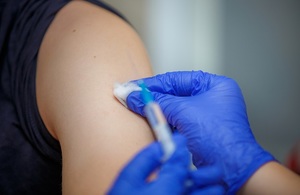
Credit UK PHE/CMO
#16,099
In the 8 months since COVID vaccines were first rolled out in late 2020 we've seen that not all of these vaccines offer equal protection, and that some have been linked to more (and potentially more problematic) side effects than others.
Two doses of the mRNA vaccines (i.e. Pfizer & Moderna) have shown superior protection against SARS-CoV-2 (roughly 90%), while the J & J and AstraZeneca vaccines have turned in respectable, but lower (roughly 70%), VE (vaccine effectiveness) ratings.
Add in concerns over rare, but serious side effects in several vaccines (see Canada: NACI Statement Recommending Halt Of AstraZeneca Vaccine For Those Under 55 & COCA Call - J&J COVID-19 Vaccine & Thrombosis with Thrombocytopenia Syndrome (TTS)), and we've seen calls for studies on the safety and effectiveness of `mixing' vaccine types between the 1st and second dose (or as a 3rd dose booster).
Mix-and-match COVID vaccines: the case is growing, but questions remain -Nature
It should be noted that most of their data comes from a time period when the Alpha variant was dominant in Denmark, and so they are unable to say whether these results hold true for the Delta variant.
(translated)
Good protection when the AstraZeneca vaccine is combined with the second dose from Pfizer / BioNTech or Moderna
New study from the Statens Serum Institut demonstrates a high efficiency of 88% of a combined vaccination program, which is comparable to the effectiveness of two doses of Pfizer / Biontech's covid-19 vaccine.
Last edited August 2, 2021Researchers from the Statens Serum Institut (SSI) have in a recently published study investigated the protection of a combined vaccination program with the covid-19 vaccine Vaxzevria® from AstraZeneca as the first dose and a COVID-19 mRNA vaccine, ie. either Comirnaty® from Pfizer / BioNTech or Spikevax® from Moderna as a second dose for SARS-CoV-2 infection and covid-19-related hospitalization and death.This combination of different vaccine types was decided when the National Board of Health in the spring of 2021 chose to continue the vaccination rollout without the use of the covid-19 vaccine Vaxzevria®. This was decided when a link was found between vaccination with Vaxzevria® and rare serious side effects.The effectiveness of a combined vaccination programIt is primarily staff in the health, elderly and selected parts of the social sector who are at particular risk of infection, or who perform a critical function ( target group 4 ), who have received the first vaccination with Vaxzevria® (99.3%). A total of 144,360 people received the first vaccination with Vaxzevria®, of which resp. 88,050 and 48,501 people received Comirnaty® or Spikevax® as a second dose.The study shows that from fourteen days after a combined vaccination program, the risk of infection with SARS-CoV-2 is reduced by 88% compared to unvaccinated individuals. This is comparable to the effectiveness of two doses of Comirnaty® of 90%, which has previously been shown in a Danish study . Furthermore, it is seen that the first dose of Vaxzevria® reduces the risk of SARS-CoV-2 infection by 29-44% in the period 14 to 83 days after the injection.No covid-19-related hospitalizations or deaths occurred after vaccination with a combined vaccination program. It was therefore not possible to estimate the effectiveness of these outcomes.The effectiveness of a combined vaccination program has been studied in the period from 8 February to 23 June 2021. The variant B.1.1.7 (alpha) was dominant after mid-February. Variant B.1.617.2 (delta) accounted for only a very small proportion of SARS-CoV-2 cases during the period. It is therefore not possible to say anything about the protection against the delta variant of the combined vaccination program on the basis of these results.Research continues at SSIResearchers at SSI continue to investigate vaccine efficacy.“It is important that we continuously uncover the effect of the vaccines in the real world, especially when we give the vaccines in combinations that have not previously been uncovered in actual lottery attempts. In addition, we must continuously monitor the effect of our vaccination programs on the new SARS-CoV-2 virus variants and find out how long the protective effect is maintained, ”says Tyra Grove Krause, Acting Technical Director at the Statens Serum Institut.
Over the past few months we've looked at several other studies looking at the safety and effectiveness of changing COVID vaccination doses, intervals between 1st and 2nd shots, and using different types of vaccine for the prime and boost shots, including:
UK Launches 1st COVID Vaccine Alternating Dose (heterologous prime-boost) Vaccination Study